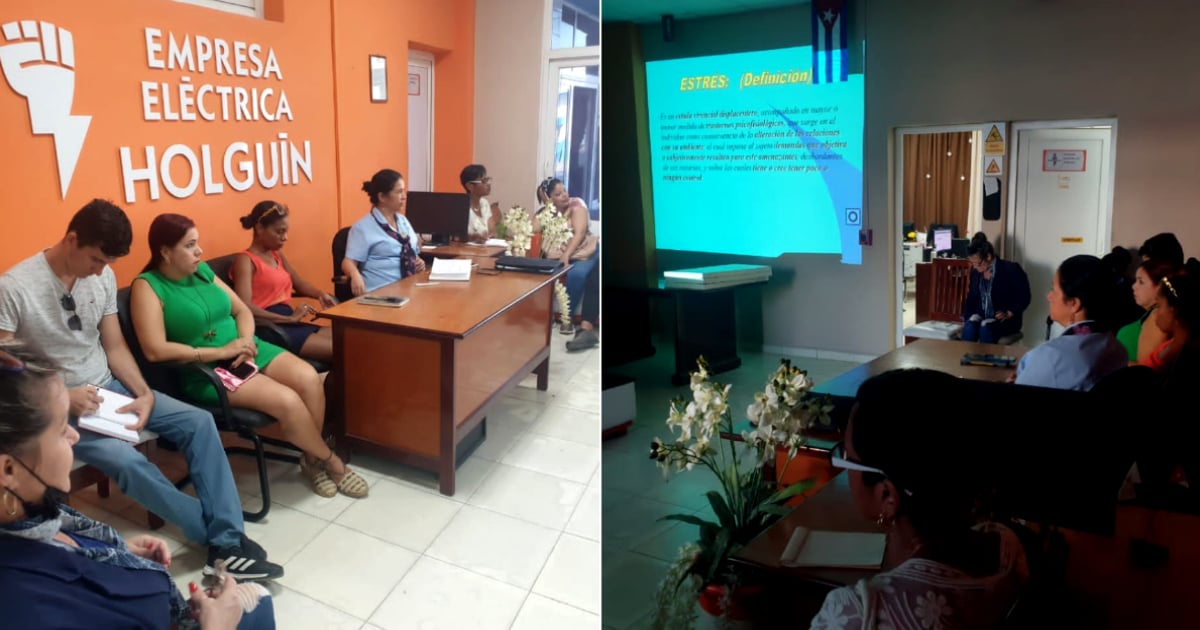
The Electric Union of Cuba (UNE) is the target of the indignation of Cubans who are enduring power outages of up to 18 hours in a single day.
For this reason, the Electric Company of Holguin has deemed it appropriate to hire the services of a psychologist to deal with the stress that this situation causes to the workers.
Like any ordinary Cuban, the workers in the electrical sector in Cuba are also affected, but they also have the responsibility of maintaining the service, even at a minimal level.
In that sense, workers have to face the public, answer the countless calls from the population to inquire or report power outages in their areas, collect payment for the electricity service even if it is nonexistent, and other tasks that add pressure to their already stressed lives as Cuban citizens, affected by scarcity, low salaries, high prices, power outages, lack of public transportation, and general crisis.
Stress is a state of physical and emotional tension originated as a response to a stimulus or pressure, whether positive or negative. It is a defense state that, in small doses, helps the body react and adapt to events," stated the Electric Company of Holguín on its social media channels.
To discuss “its implications and effects,” the state-owned company invited Mr. José Luis Cruz Alonso to give a talk on this topic during the monthly union and communication meeting held by the organization.
It was an opportune moment to discuss this phenomenon inherent to the current social context,” considered the Electric Company of Holguin, assuming that stress is an inherent part of the current energy crisis.
Unable to solve the collapse of the national electro-energetic system (SEN), as well as other serious problems such as inflation or food production, the Cuban regime is desperately seeking new formulas to keep alive its decaying propaganda, whose canned messages are rejected by the majority of Cubans.
From "spiritual forces" to "psychological attention": The propaganda of the Cuban regime deepens its decline.
The resource of "psychological attention" as part of the social control exerted by the government over citizens is part of an old manipulative vision, whose paradigm has taken shape over the years of the broadcasting of the television program "Vale la pena" led by psychologist Manuel Calviño.
The initiative of the Electric Company of Holguin seeks to address the mood of its employees, bringing it to the realm of "normalcy" (it is normal to be stressed) to prevent the affected workers' mood from taking a different course, such as leaving their jobs or expressing politically biased discontent.
The strategy of “releasing pressure” without the “stressed” individuals focusing on the management of the government has reached such absurd situations as the recent statement by a Cuban spiritualist association (Sociocultural Project Cabildo Quisicuaba), in its latest meeting, promised to save the homeland, the revolution, and socialism.
"It is necessary to unleash the productive forces as well as the spiritual forces of the Revolution," said the ruler Miguel Díaz-Canel in mid-December of last year. "That is the way to strengthen the pride of being Cuban," he added.
One of her most loyal followers, recently removed from her position of power in Matanzas, had already stated in September 2022: "Ashé for all Cubans, ashé for the Cuban revolution." Her desires were heard, and Díaz-Canel included her at the end of March in his agenda of "movement of followers," ousting her from her position as first secretary of the provincial committee of the Communist Party in that province.
During the time when Susely Morfa González was bestowing her Afro-Cuban blessings upon the so-called "revolution," Díaz Canel was calling for working "with people's spirituality" and speaking learnedly about "the need to transform the spiritual dimension of individuals, and do it for the good."
The intellectual poverty and moral indigence of the regime's propagandists are taking their political discourse to levels of absurdity and ridicule never seen before. The communist regime aims to deal with the intangible to save the "revolution" with the help of the beyond, whether through "cosmic energy" or by developing "spiritual forces" in Cubans, so that they rediscover the "mythical breath of the revolution."
While Díaz-Canel calls for "rediscovering the paths of legend and heroism," other followers of his strategy end up being ousted, such as former Minister of Economy and Planning, Alejandro Gil Fernández, who resorted to faith to cope with the misfortune caused by his policies.
We know that it is difficult to find daily food, it is difficult to face an eight to ten hour power outage, transportation issues... but have faith, the only way out is through revolution and socialism," said the official who now contemplates the brevity of life in the cells of Villa Marista.
The systemic and widespread crisis in Cuba cannot be solved by appealing to "spiritual forces" or through a better understanding of the human psyche, but in the field of politics, social dialogue, and the political will to initiate a process of radical change: something that Calviño or Cruz Alonso surely sense, but will never dare to say out loud.